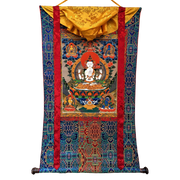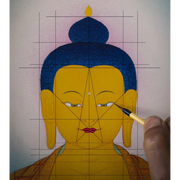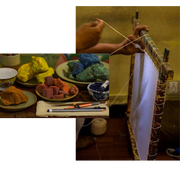Vajradhara Thangka
BLACK FRIDAY SALE
Get it between - .

Tibetan Thangka painting depicting Vajradhara is perfect for various home décor ideas! This 100% hand-drawn Thangka painting made in Kathmandu Valley, Nepal can be decorated as an elegant and eccentric wall hanging in your home or office being a centrepiece of attention. It can also be placed on your family altar for meditation purposes as well as spiritual and emotional healing, attracting benevolent energy of the Tibetan Buddhist art.
- Fine Quality Thangka Painting
- Dimensions: 52 x 38 cm
- Materials: 24 Carat Gold With Tibetan Colors mixed with Hide Glue
- Canvas: Organic Cotton
- Origin: Nepal
- Hand Painted In Nepal
Vajradhara, the literal translation Holder of the diamond sceptre, is the manifestation of Buddha Shakyamuni used to reveal the tantric teaching to those capable of following the Vajrayana path. He embraces his consort Vajradhatu Ishvari symbolizing the profound absorption into the clear light nature of the mind, devoid of limitations and pervaded by total bliss.
The name Vajradhara means the bearer of the lightning scepter. The inherent tradition of lightning representing transformation & energy originates 2,500 c. BCE. The term Vajra is a typical Sanskrit word being a composite of VA- meaning to bear or carry, ja or ja whose syllable denotes the energy & Ra meaning to rise, overcome, or power.
A vajra scepter is a special object that embodies the principle of change. Conjoined prongs at each end denote lightning bolts and they’re being conjoined denotes latent self reacting energy. In effect as important to Buddhism as the Cross to Christianity.
The Vajra has four prongs enclosing a fifth central prong making five in total and at both ends. The tridents are another representation of the lightning more associated with Hinduism. Varjadhara’s arms are crossed in a gesture of victory over the Three Worlds with reference to the syllable ‘Hum’, & is seated in the lotus seat.
The lotus seat & the crossed arms mudra are together called the Skt. Vajrasana or Position of transcendent change. The white sash draped across Vajradharas chest represents the purity and essence of the Vajrayana school of Buddhism.
In fact, Mahayana & Hinayana both arise from the ancient Vajrayana tradition of personal transformation.
You can find answers to common questions on our FAQ page here.
View all our shop reviews at reviews page here.











